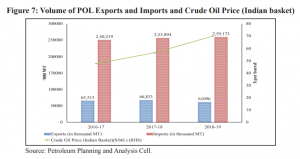
There is a raging debate over India’s purchase of Russian oil after the invasion of Ukraine. A lot has changed in the last four weeks in terms of global geopolitics, especially in eastern Europe and the Baltic region, which has brought the focus on global oil trade. India has so far pursued an independent policy and kept itself equidistant from either side of the Ukrain conflict. India’s position has come under scrutiny of the global community owing to this distinct approach.
In the melee, India’s oil purchases from Russia that account for just about 1% of its total oil imports have been questioned by pro-western commentators. Despite all the flak it receives, India’s decision to buy about 33 million barrels of oil from Russia’s Rosneft is pragmatic and rooted in long-term sustainability. On March 9, an internal note was circulated among the top echelons of the Narendra Modi government. People in the know of things divulged that on March 11, Prime Minister Modi himself took the call to continue with the oil imports from Russia.
READ I Explained: Ukraine conflict impact on India’s trade
Sweetened Russian oil deal
Russian President Vladimir Putin, who is facing global isolation, seems to have more than accommodated India’s demands in oil and other bilateral trade deals. Russia has offered deep discounts, insurance costs, and the safe passage and delivery of crude at Indian ports – a tempting package for the world’s third largest oil importer.
Payment in rupees or settlement against the Russian Ruble at pre-designated rates provides a cushion for Finance Minister Nirmala Sitharaman, whose budget maths would have otherwise gone awry with Brent crude prices which has touched $121.9 per barrel on Wednesday. Setting off oil payments against Russian imports is not a bad idea and does not violate free trade principles in words and spirit. Hence Indian Oil, Bharat Petroleum, Mangalore Refineries & Petroleum Ltd, and a host of crude importers jumped into the fray to conclude contracts that would translate into billions of dollars. Not just Russia, but all of West Asia has been tapped to conclude deals.
READ I Ukraine war: Rising crude may spell doom for world economy
With the US and UK phasing out hydrocarbon imports from Russia and the European Union seeking to follow suit, handsome deals may still be possible in local currencies to get around the sanctions. Iran was the biggest oil supplier to India till it fell victim to Donald Trump’s sanctions. Taking a cue from Russian deals, Iran offered to resume rupee-rial designated oil supplies with bilateral trade potential of $30 billion. From $17 billion in the pre-sanction era of 2019, bilateral trade with Iran has plunged to a modest $2 billion in 2021-22.

The US and its NATO allies must recognise India’s compulsions, as the country meets 85% of its crude requirements through imports. While the world is criticising India’s oil imports from Russia, India is all set to increase its share of oil import from the US by 11%. Both the EU and the US have till now not considered India’s oil deals with Russia as a violation of Ukraine-related sanctions. But western lobbyists and the rumour mills have been working overtime to put India on the defensive for its oil deals with Russia.
India need not feel apologetic for exploring local currency-based trade deals. The deal with Russia could be the beginning of many such transactions that could replace those in the dollar or euro. The four largest oil suppliers – the US, UAE, Saudi Arabia and Nigeria – should also explore more innovative deals with India.
Oil deals – both in spot and futures markets – concluded by India cannot be subjected to sanctions, which are the latest weapons used by the West. India’s economic and political interests are diverse and each response from New Delhi is laced with nuances that cannot be ignored by the global community. It does not necessarily mean that India should not consider other energy options that limit its dependency on hydrocarbons.
(The author is Director and Chief Executive of the Centre for Integrated and Holistic Studies, a New Delhi-based think tank. Views expressed are personal.)

